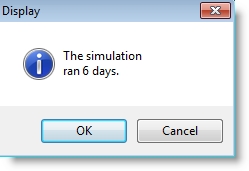
Any text to be written to a file or displayed on the screen is created with a string expression. String expressions are created from a combination of the following:
| Ent() | |
| Concatenation operators "$" | Loc() |
| Numeric Expressions | Res() |
| Char() | Format() |
A string expression must begin with a concatenation operator ($) or with a string constant in quotes (i.e., “...”). The concatenation operator combines components together, and must be between all components of a string expression. For example, if Attr1 is 7.83, then the expression “STRING1”$ ATTR1 $ “STRING2” evaluates to “String17.83String2.”
To output the name of a location, entity, or resource, use the appropriate function inside a string expression: Loc() for locations, Ent() for entities, and Res() for resources. For example, the following logic checks the first ten locations in a model and displays the name of any location that is completely full.
Display name of full location
Var1 = 1
While Var1 <= 10 Do
Begin If FreeCap(Loc(Var1)) = 0 Then Display Loc(Var1) $ “is full.” Inc Var1 End
String expressions are valid only as part of the following statements and functions: Display, Pause, Prompt, Stop, Write, Writeline, Trace, Xsub(), and Xwrite.
String expressions
If a model had been running for six days, the statement
Display “The simulation ran \n” $ Clock(day) $ “days.”
would display the following dialog box.

|
© 2016 ProModel Corporation • 556 East Technology Avenue • Orem, UT 84097 • Support: 888-776-6633 • www.promodel.com |